Profiles and research interests of my group members.
Current members
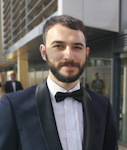
Jacob ArmstrongJacob is a Data Scientist and originally joined the group in August 2018. He is now a member of the Health Data Sciences Doctoral Training Centre at the Big Data Institute, pursuing his doctorate. He previously worked as the lead data developer at a financial analytics company in London, and before this completed his undergraduate degree in Mathematics at the University of Oxford. He has developed a record linkage system between health records maintained by Public Health England and UK Biobank. Utilising this will help study the genetic basis of infection risk from both a human and microbial perspective. When not exploring datasets he can usually be found in the local judo or jiu-jitsu club. He plays the guitar on his nights off. |

David ShawDavid is studying for a D.Phil. at the Big Data Institute, Nuffield Department of Population Health, with Angela Brueggemann and Daniel Wilson. He is clinically trained as an anaesthetist and deferred his studies in 2020 to serve on the front line in Ireland during the COVID-19 pandemic. The focus of David's studies is microbial genomics, in particular traits of biomedical importance in streptococci. |

Pramod ErrollaPramod joined the group as a Bioinformatician in May 2022, based at the Big Data Institute, Nuffield Department of Population Health, Oxford. After receiving an MSc in Applied Bioinformatics from Cranfield University, he worked for General Bioinformatics Ltd as a Bioinformatics Consultant. He followed this up with a Bioinformatician position at the Leeds Cancer Centre (LTHT - NHS Trust). Pramod is interested in genome-wide association studies and RNAseq-based studies of differential gene expression in bacterial pathogens. |

Dr Helen FryerHelen is a senior postdoctoral scientist who joined the group in 2022. Her work focuses on the design and application of statistical genetics methodology to investigate how host-pathogen genetic interactions shape the development of disease. Her background lies in the development of methods at the interface of dynamical modelling, evolutionary modelling, and statistics. She has used these methods to investigate within-host interactions of pathogens and immune responses, with a particular focus on HIV-1. She has also investigated the relationship between viral evolution at the within-host and epidemiological scales. |

Jeff ChenJeff is a computational statistician and data science executive with experience in 40 domains, such as emergency management, climate change, economics and statistics, and video streaming services. He is pursuing a DPhil at the Department for Continuing Education, co-supervised by Daniel Wilson and Anders Kock. His research investigates harmonized hypothesis testing through machine learning. He holds an MA in Quantitative Methods from Columbia University and a BA Cum Laude in Economics from Tufts University. |
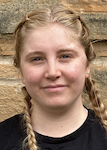
Isobel GuthrieIsobel Guthrie is a DPhil student who joined the group in 2023. She graduated from the University of St Andrews in 2022 with a BSc (Hons) in Biology, before joining the Genomic Medicine and Statistics DPhil programme. Her project focuses on the phylodynamics of SARS-CoV-2, examining how the background genetic diversity of SARS-CoV-2 affects inferences of transmission and selection. |

Dr Hugh WhiteHugh is a postdoctoral researcher based primarily in the John Radcliffe Hospital, Oxford in the Nuffield Department of Population Health. Starting his academic career with a BSc in Zoology, Hugh continued his studies with an MSc in Evolutionary and Behavioural Ecology, before specialising in bacterial ecology during his PhD funded by the BBSRC SWBio doctoral training partnership. His doctoral research aimed to identify the primary processes involved in the maintenance of distinct bacterial clades, focussing on the importance of key ecological traits in maintaining clade distinctiveness. His current work will focus on setting up a comprehensive library of clinical microbiological samples as part of the Bugbank study, and building upon work investigating the transition from a commensal to a pathogenic lifestyle in Staphylococcus aureus. |
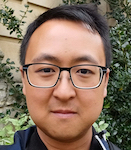
Dr Shing ZhanShing is an incoming NDPH Intermediate Fellow based at the Big Data Institute. With a diverse background in evolutionary biology, ecology, and molecular diagnostics, he is focusing on understanding the emergence of antimicrobial resistance and virulence in bacterial pathogens. His long-term goal is to contribute to the evidence base for informing antibiotic stewardship and infection control practices. To this end, he is working with Prof. Daniel Wilson and Prof. Jerome Kelleher (NDM) to develop and apply novel computational methodologies to extract epidemiological insights from large-scale bacterial genomic datasets. Before joining Oxford, he co-launched a startup in Canada in infectious disease diagnostics and concurrently completed his PhD in bioinformatics at the University of British Columbia (Canada) with Prof. Sarah P. Otto. |
Former members
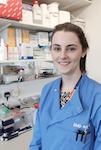
Dr Justine RudkinJustine is a former postdoctoral researcher in the Nuffield Department of Population Health, based at the John Radcliffe Hospital, Oxford. She is now a lecturer at the University of Glasgow. After receiving a BSc in Tropical Disease Biology from the University of Liverpool, she completed her PhD at the University of Bath, studying the interplay between antimicrobial resistance and virulence in Staphylococcus aureus. She followed this up with postdoctoral positions at the National University of Ireland, Galway, and University College Cork, Ireland. After a 2-year Irish Research Council funded fellowship at University College Cork studying the impact of niche adaptation on the virulence of food-borne pathogens, she moved back to the UK in October 2018 to join the Wilson lab. Using transcriptomic and proteomic approaches, her research focused on within-host evolution of S. aureus to determine how the commensal to pathogenic switch occurs, and its impact on virulence and host-pathogen interactions. |

Dr Steven LinSteven Lin is a former research assistant and joined the group in November 2017. He previously graduated with an MSc in Bioinformatics and Theoretical Systems Biology from Imperial College London. He was working as a member of the STOP HCV consortium under the supervision of Prof. Daniel Wilson and Prof. Ellie Barnes. His work focuses on genome-wide association studies into the development of cirrhosis in hepatitis C infected patients. The project integrated host and virus genetic data together with epidemiological records into the analysis.
|

Dr Nicolas ArningNick completed his DPhil with the Interdisciplinary Biosciences Doctoral Training Partnership and the Wilson lab. His work focused on using different Machine learning techniques in order to attribute sources to Campylobacter jejuni sequencing samples or genomes, and analysis of risk factors for COVID-19 in UK Biobank. Nick received a MSc from the Westfaelische-Wilhelms Universitaet (WWU) working on comparative genomics within Blattodea. He additionaly studied at the University of British Columbia reconstructing ancestral sequences within the nitroreductase superfamily. He received his BSc also from the WWU during which he also studied at the University of Sheffield. His BSc project was developing a pipeline for the analysis of de novo genes. |

Dr Kasia ParfittKasia was a Research Assistant working in the Nuffield Department of Population Health at Oxford's John Radcliffe Hospital. She is researching alongside Justine Rudkin on the switch of S. aureus from commensal to pathogen, joining the group in mid-2022. She holds a BSc and MSc in Microbiology and had recently finished her PhD studying Burkholderia multivorans population biology, using next generation sequencing approaches, at Cardiff University. |

Dr Alejandra Vergara-LopeAlejandra was a postdoctoral scientist based at the Big Data Institute, University of Oxford, supervised by Dr Daniel Wilson. Her work involved developing computationally tractable inference based on composite likelihood of common population genetics models under the coalescent theory. The project integrated pathogen genetic sequence data to understand patterns of disease transmission. Alejandra did an integrated PhD in Next Generation Computational Modelling with the Centre for Doctoral Training at the University of Southampton funded by Engineering and Physical Sciences Research Council (EPSRC), UK and The National Council Science and Technology (CONACyT), Mexico. Alejandra undertook her research project within the genomic informatics group under the supervision of Professor Andrew Collins and Dr Reuben Pengelly, working on the application of mathematical tools for analysis of genome function, linkage disequilibrium structure and disease gene prediction. |

Dr Joshua ThomasJosh is a former D.Phil. student based in the Department of Zoology, supervised by Prof. Ashleigh Griffin, Dr. Melanie Ghoul, and Dr. Daniel Wilson. His work focused on understanding the role of antimicrobial production by Staphylococcus aureus in the human nasal cavity, particularly from an ecological and evolutionary perspective. Josh previously received a B.A. in Biological Sciences also from the University of Oxford. His undergraduate research project focused on plant cooperation and the function of a candidate cooperative gene (GA5). |

Dr Kevin ColeKevin studied for a Ph.D. at the Open University under the supervision of Martin Llewelyn, John Paul and Daniel Wilson. The focus of his research was the genome evolution of Staphylococcus epidermidis. Previously Kevin worked for the Brighton and Sussex University Hospitals NHS Trust. He has a long-standing interest in the genomics and evolution of microbes, in particular staphylococcal species. |

Dr Sarah EarleSarah is a former postdoctoral scientist based at the Big Data Institute, University of Oxford, supervised by Dr Daniel Wilson. Her work exploited whole-genome sequencing data of bacterial pathogens to carry out whole-genome association studies, with the aim of discovering genes and genetic variants associated with differential virulence, whilst controlling for confounding factors such as population structure within models. She previously studied at the University of Oxford where she completed her D.Phil. funded by an NDM Prize Studentship and before that a BA in Biological Sciences. She undertook her undergraduate research project within the research group of Prof. Martin Maiden, working on the application of ribosomal multilocus sequence typing for Staphylococcus aureus. |
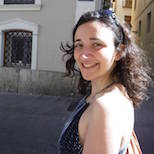
Dr Clara GrazianClara is a former Postdoctoral Scientist who joined the group in January 2017, after completing a double PhD in Applied Mathematics and Statistics in Université Paris-Dauphine and Sapienza Université di Roma, where she studied methods to perform Bayesian inference for complicated models, such as dependence and mixture models. She was involved in studying the mechanisms of development of drug resistance in Mycobacterium tuberculosis, by using genome-wide association studies. In her work, she tries to use both frequentist and Bayesian methodologies to work with large datasets. |

Dr Bernadette YoungBernadette is a former Wellcome Trust Clinical Research Fellow, based in the Oxford University Hospitals NHS Trust and undertaking a DPhil in the Nuffield Department of Medicine at the University of Oxford, supervised by Dr Daniel Wilson and Prof. Derrick Crook. Her work focuses on using whole genome sequencing to understand the genetic basis for variations in virulence seen in the bacterium Staphylococcus aureus. This organism is frequently part of the normal human flora, particularly in the nose, but it can also cause life-threatening invasive infection. Bernadette trained as a medical doctor at the University of Melbourne, Australia, completing her MBBS(Hons) as well as a BA (literary studies). She continued her clinical training in the UK, and is undertaking specialist training in Infectious Diseases. She now lives in Oxford, and can be found playing the ukulele on nights off. |

Dr Nicola De MaioNicola is a former James Martin Fellow at the Oxford Martin School Institute for Emerging Infections, working on the Curing Chronic Viral Infections project. He studied Mathematics at the University of Pisa (BSc and MSc). He is interested in the development and application of models of sequence evolution. During his PhD studies, Nicola focused on Empirical Codon Models, positive selection tests, and population genetics-phylogenetic models, in the face of genome-wide data availability. He also collaborated on the development of statistical methods for pooled data, and the modelling of life history traits. In his research in Oxford, Nicola focused on viral evolution. in particular, he investigates the effects of viral recombination on phylogenetic, demographic, and epidemiological analysis. He plays basketball, soccer, and water polo. He is now at the EBI in Hinxton. |
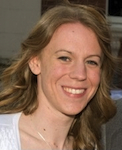
Dr Melissa WardMelissa Ward is a former Sir Henry Wellcome Postdoctoral Fellow, funded by the Wellcome Trust. She is working between the University of Oxford, the University of Edinburgh, the International Livestock Research Institute Nairobi and the Harvard School of Public Health. Her work involves using pathogen genetic sequence data to understand patterns of disease transmission, with a focus on the spread of MRSA within the Scottish healthcare system and the spread of E. coli between humans and livestock in low income areas of Nairobi, Kenya. During her PhD at the University of Edinburgh, Melissa studied the evolution of viruses such as HIV, influenza and Japanese Encephalitis. Prior to this, she completed an undergraduate degree in Mathematics at the University of Oxford. |

Dr Jessie WuJessie is a former postdoctoral scientist based in the Nuffield Department of Medicine at the University of Oxford. Her work focuses on developing statistical methods to investigate the genetic basis of virulence in natural populations of bacterial pathogens. During her PhD at the University of Auckland, she focused on Bayesian approaches to model uncertainty in phylogenetics. |
Dr Claudia Lindemann
Claudia is a former DPhil student in the Vactrain project (www.vactrain.eu) at the Jenner Institute in Oxford. Under the supervision of Dr David Wyllie and Dr Daniel Wilson, she is working on Stapylococcus aureus vaccine development, using RNA sequencing to discover new antigens for potential vaccines and understand bacterial pathogenesis within the host. Previously she did her Masters at the University of Münster in Pharmaceutical science, studying surface expression systems of heterologous proteins and a Bachelor's degree in Chemical Biology at the TU Dortmund. In her spare time Claudia enjoys rowing, (latin) dance and theatre (watching as well as getting engaged herself). |
Dr Jessica Hedge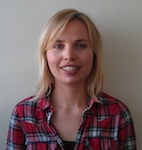
Jess is a former postdoctoral scientist working within the Nuffield Department of Medicine at the University of Oxford. She is interested in the evolutionary dynamics of measurably evolving pathogens and uses phylogenetic methods to explore a variety of evolutionary processes, including the origin and evolution of different norovirus lineages and the emergence of drug resistance in Mycobacterium tuberculosis. Her work also focuses on the effects of recombination on the reconstruction of the evolutionary history of bacterial populations. During her PhD at the University of Edinburgh supervised by Prof. Andrew Rambaut, she used Bayesian phylogenetic methods to characterise the evolution and molecular epidemiology of the 2009 influenza A H1N1 pandemic. |
Dr Jane Charlesworth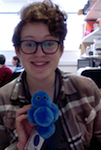
Jane is a former postdoc working on the MMM project, specialising in applying population genetics methods to bacterial datasets. She did a degree in genetics at the University of Edinburgh followed by a PhD in bacterial population genetics at the University of Sussex, with Adam Eyre-Walker. At the time of her PhD research, there were only six complete genomes for E. coli and Salmonella, so she is quite excited about the potential of next generation sequencing to reveal the finer details of bacterial population structure. Jane is particularly interested in detecting loci that have been under selection during both long and short-term bacterial evolution. Aside from research, Jane is interested in education and was recently awarded a fellowship from the Software Sustainability Institute to develop materials to encourage biology students to engage with computing. In her spare time Jane plays roller derby, writes novels, teaches children to code and cruises the canals on a narrowboat. |

Dr Richard EverittRich is a former Postdoctoral Scientist in the Nuffield Department for Clinical Medicine, working on the Modernising Medical Microbiology project funded by UKCRC. His background is in (mostly Bayesian) statistics and machine learning, which he used to investigate the evolution of pathogens through the study of full genomic data. He was formerly a Brunel Fellow in Statistics in the Department of Mathematics at the University of Bristol (where he also studied for his PhD under the supervision of Prof. Peter Green). Prior to this he was a researcher at QinetiQ, specialising in target tracking, signal and image processing and classification. Richard's primary research interests are in methodological work in Bayesian statistics, in both inference and modelling. The majority of his work on inference is in Markov chain Monte Carlo, sequential Monte Carlo and approximate Bayesian computation, with his modelling interests focussing on graphical models and non-parametrics. He has an ongoing interest in the use of computers in computational statistics. Richard is now an Associate Professor at the University of Warwick. You can visit his website here. |
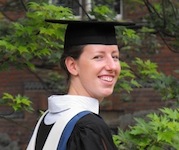
Dr Bethany DearloveBethany is a former DPhil student based in the Nuffield Department of Medicine at the University of Oxford, supervised by Dr Daniel Wilson and Prof. Peter Donnelly. Her work was focussing on the genomic evolution of various pathogens as part of the Modernising Medical Microbiology Consortium, using new technology to obtain genetic information in real time. From this, the aim was to find patterns of evolution to further understand the spread and transmission of disease, particularly for three pathogens commonly acquired in hospitals. She previously studied at the University of Reading, where she completed both her MSc. in Biometry and BSc. Mathematics and Statistics. It was here she was introduced to the concept of Forensic and Genetic Statistics by Dr. Karen Ayres, inspiring her current research interests. Bethany's Masters project focused on a forensic application of statistics, investigating techniques for familial searching in the UK National DNA Database with missing data and low copy number DNA profiles. Whilst in Reading, she competed in synchronised swimming, and has been nationally ranked in Great Britain for a number of years - her best results coming in 2009 where she was the British silver medallist in the solo and team events, and was named the Reading Evening Post Sports Personality of the Year for Player Loyalty. In Oxford, she was more likely to be seen keeping fit by running or cycling, though still to be found on poolside coaching and choreographing routines. |

Ben UmansBen joined the lab for the summer of 2012 to work on models of mutation and selection in bacteria as a Masters student in the Department of Statistics. A native of Chicago, he returned to the US in 2013 to begin a PhD in Genetics. |